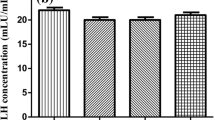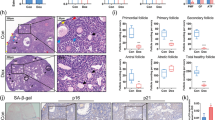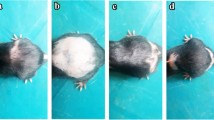Abstract
Polysaccharides from Dendrobium officinale polysaccharides (DOPs) are the main bioactive components of Dendrobium officinale, which have the functions of antioxidation and immune regulation. However, it is not clear whether DOPs have any effect on the prevention of reproductive disorders induced by oxidative stress. The purpose of this study was to explore the protective effect of DOPs on reproductive oxidative stress injury in male mice and its possible mechanism. In this study, the mouse model of reproductive injury was established by intraperitoneal injection of cyclophosphamide (CTX). The reproductive function was evaluated by relative testicular mass, sperm parameters, and sex hormone levels. The oxidative stress level of male mice with reproductive injury treated with DOPs was analyzed by the levels of 8-hydroxydeoxyguanosine (8-OHdG), malondialdehyde (MDA), and nitric oxide (NO) in sperm. The expression of follicle-stimulating hormone receptor (FSHR) mRNA, androgen-binding (ABP) mRNA, and c-kit mRNA was detected by quantitative reverse transcriptase polymerase chain reaction (qRT-PCR) to explore its mechanism. After CTX administration, the sperm density, sperm motility, normal sperm morphology, and sex hormone levels in mice were significantly lower than those in the control group (P < 0.05). At the same time, the expression of p53 protein was upregulated, and the expression of Bcl-2 protein was downregulated (P < 0.05). In addition, the expression of FSHR and ABP mRNA on Sertoli cells was also significantly inhibited (P < 0.05). DOPs can effectively reduce the oxidative stress injury of testicular tissue. After DOP treatment, the sperm quality and sex-related hormone levels of mice were significantly improved and positively correlated with the dose of DOPs (P < 0.05). Administration of DOPs can reduce the damage caused by oxidative stress by reducing the level of oxidative stress, improving the hormone environment in testes, and regulating the expression of specific genes in Sertoli cells and spermatogenic cells.





Similar content being viewed by others
Data availability
The dataset used in the current study is available from the corresponding author upon reasonable request.
Abbreviations
- ROS:
-
Reactive oxygen species
- DOPs:
-
Dendrobium officinale polysaccharides
- GPX:
-
Glutathione peroxidase
- MDA:
-
Malondialdehyde
- CTX:
-
Cyclophosphamide
- ELISA:
-
Enzyme-linked immunosorbent assay
- FSH:
-
Follicle-stimulating hormone
- LH:
-
Luteinizing hormone
- T:
-
Testosterone
- NO:
-
Nitric oxide
- OD:
-
Optical density
- GAPDH:
-
Glyceraldehyde 3-phosphate dehydrogenase
- LPO:
-
Lipid peroxidation
- INOS:
-
Inducible nitric oxide synthase
- HPG:
-
Hypothalamic-pituitary-gonadal
References
Abd-Elsalam RM, El BS, Ogaly HA, Ibrahim FM, Farag OM, Ahmed KA (2021) Eruca sativa seed extract modulates oxidative stress and apoptosis and up-regulates the expression of bcl-2 and bax genes in acrylamide-induced testicular dysfunction in rats. Environ Sci Pollut Res Int 28:53249–53266. https://doi.org/10.1007/s11356-021-14532-y
Afkhami-Ardakani M, Hasanzadeh S, Shahrooz R, Delirezh N, Malekinejad H (2021) Spirulina platensis (arthrospira platensis) attenuates cyclophosphamide-induced reproductive toxicity in male wistar rats: evidence for sperm apoptosis and p53/bcl-2 expression. J Food Biocheme:e13854. https://doi.org/10.1111/jfbc.13854
Agarwal A, Parekh N, Panner SM et al (2019) Male oxidative stress infertility (mosi): proposed terminology and clinical practice guidelines for management of idiopathic male infertility. World J Mens Health 37:296–312. https://doi.org/10.5534/wjmh.190055
Barati E, Nikzad H, Karimian M (2020) Oxidative stress and male infertility: current knowledge of pathophysiology and role of antioxidant therapy in disease management. Cell Mol Life Sci 77:93–113. https://doi.org/10.1007/s00018-019-03253-8
Bhattacharjee P, Das A, Giri AK, Bhattacharjee P (2020) Epigenetic regulations in alternative telomere lengthening: understanding the mechanistic insight in arsenic-induced skin cancer patients. Sci Total Environ 704:135388. https://doi.org/10.1016/j.scitotenv.2019.135388
Bisht S, Faiq M, Tolahunase M, Dada R (2017) Oxidative stress and male infertility. Nat Rev Urol 14:470–485. https://doi.org/10.1038/nrurol.2017.69
Cengiz M, Sahinturk V, Yildiz SC et al (2020) Cyclophosphamide induced oxidative stress, lipid per oxidation, apoptosis and histopathological changes in rats: protective role of boron. J Trace Elem Med Biol 62:126574. https://doi.org/10.1016/j.jtemb.2020.126574
Chen X, Chen J, Gan S et al (2013) Dna damage strength modulates a bimodal switch of p53 dynamics for cell-fate control. Bmc Biol 11:73. https://doi.org/10.1186/1741-7007-11-73
Cho KH, Hyun JH, Chang YS, Na YG, Shin JH, Song KH (2010) Expression of nitric oxide synthase and aquaporin-3 in cyclophosphamide treated rat bladder. Int Neurourol J 14:149–156. https://doi.org/10.5213/inj.2010.14.3.149
Christin-Maitre S, Young J (2022) Androgens and spermatogenesis. Ann Endocrinol (Paris) 83:155–158. https://doi.org/10.1016/j.ando.2022.04.010
Correia S, Alves MR, Cavaco JE, Oliveira PF, Socorro S (2014) Estrogenic regulation of testicular expression of stem cell factor and c-kit: implications in germ cell survival and male fertility. Fertil Steril 102:299–306. https://doi.org/10.1016/j.fertnstert.2014.04.009
Cp C (2020) Chinese pharmacopoeia: part 1(Chinese). China Medical Science and Technology Press, Beijing
Darbandi M, Darbandi S, Agarwal A et al (2018) Reactive oxygen species and male reproductive hormones. Reprod Biol Endocrinol 16:87. https://doi.org/10.1186/s12958-018-0406-2
De Iuliis GN, Thomson LK, Mitchell LA et al (2009) DNA damage in human spermatozoa is highly correlated with the efficiency of chromatin remodeling and the formation of 8-hydroxy-2'-deoxyguanosine, a marker of oxidative stress. Biol Reprod 81:517–524. https://doi.org/10.1095/biolreprod.109.076836
Hansson V, Weddington SC, Petrusz P, Ritzen EM, Nayfeh SN, French FS (1975) Fsh stimulation of testicular androgen binding protein (abp): comparison of abp response and ovarian augmentation. Endocrinol 97:469–473. https://doi.org/10.1210/endo-97-2-469
Hassanin AM, Ahmed HH, Kaddah AN (2018) A global view of the pathophysiology of varicocele. Andrology 6:654–661. https://doi.org/10.1111/andr.12511
Huang S, Chen F, Cheng H, Huang G (2020) Modification and application of polysaccharide from traditional Chinese medicine such as Dendrobium officinale. Int J Biol Macromol 157:385–393. https://doi.org/10.1016/j.ijbiomac.2020.04.141
Johnsen SG (1970) Testicular biopsy score count--a method for registration of spermatogenesis in human testes: normal values and results in 335 hypogonadal males. Hormones 1:2–25. https://doi.org/10.1159/000178170
Kiyozuka Y, Yamamoto D, Yang J et al (2000) Correlation of chemosensitivity to anticancer drugs and telomere length, telomerase activity and telomerase rna expression in human ovarian cancer cells. Anticancer Res 20:203–212
Li M, Zhou M, Wei Y et al (2020) The beneficial effect of oyster peptides and oyster powder on cyclophosphamide-induced reproductive impairment in male rats: a comparative study. J Food Biochem 44:e13468. https://doi.org/10.1111/jfbc.13468
Liu F, Li XL, Lin T et al (2012) The cyclophosphamide metabolite, acrolein, induces cytoskeletal changes and oxidative stress in sertoli cells. Mol Biol Rep 39:493–500. https://doi.org/10.1007/s11033-011-0763-9
Lu WP, Mei XT, Wang Y, Zheng YP, Xue YF, Xu DH (2015) Zn(II)-curcumin protects against oxidative stress, deleterious changes in sperm parameters and histological alterations in a male mouse model of cyclophosphamide-induced reproductive damage. Environ Toxicol Pharmacol 39:515–524. https://doi.org/10.1016/j.etap.2014.12.014
Luo QL, Tang ZH, Zhang XF et al (2016) Chemical properties and antioxidant activity of a water-soluble polysaccharide from dendrobium officinale. Int J Biol Macromol 89:219–227. https://doi.org/10.1016/j.ijbiomac.2016.04.067
Mauduit C, Hamamah S, Benahmed M (1999) Stem cell factor/c-kit system in spermatogenesis. Hum Reprod Update 5:535–545. https://doi.org/10.1093/humupd/5.5.535
Momeni HR, Eskandari N (2020) Curcumin protects the testis against cadmium-induced histopathological damages and oxidative stress in mice. Hum Exp Toxicol 39:653–661. https://doi.org/10.1177/0960327119895564
Oldereid NB, Angelis PD, Wiger R, Clausen OP (2001) Expression of bcl-2 family proteins and spontaneous apoptosis in normal human testis. Mol Hum Reprod 7:403–408. https://doi.org/10.1093/molehr/7.5.403
Saba E, Lee YY, Kim M, Kim SH, Hong SB, Rhee MH (2018) A comparative study on immune-stimulatory and antioxidant activities of various types of ginseng extracts in murine and rodent models. J Ginseng Res 42:577–584. https://doi.org/10.1016/j.jgr.2018.07.004
Sun X, Sun H, Yu K et al (2018) Aluminum chloride causes the dysfunction of testes through inhibiting the atpase enzyme activities and gonadotropin receptor expression in rats. Biol Trace Elem Res 183:296–304. https://doi.org/10.1007/s12011-017-1120-1
Toocheck C, Clister T, Shupe J et al (2016) Mouse spermatogenesis requires classical and nonclassical testosterone signaling. Biol Reprod 94:11. https://doi.org/10.1095/biolreprod.115.132068
Wang W, Li X, Zhang Y, Zhang J, Jia L (2022) Mycelium polysaccharides of macrolepiota procera alleviate reproductive impairments induced by nonylphenol. Food Funct 13:5794–5806. https://doi.org/10.1039/d2fo00680d
Wang Y, Liang CL, Wu JQ, Xu C, Qin SX, Gao ES (2006) Do ureaplasma urealyticum infections in the genital tract affect semen quality? Asian J Androl 8:562–568. https://doi.org/10.1111/j.1745-7262.2006.00190.x
Wang Y, Zou Z, Jaisi A, Olatunji OJ (2021) Unravelling the protective effects of emodin against cyclophosphamide induced gonadotoxicity in male Wistar rats. Drug Des Devel Ther 15:4403–4411. https://doi.org/10.2147/DDDT.S333383
Wen Y, Xiao H, Liu Y et al (2021) Polysaccharides from dendrobium officinale ameliorate colitis-induced lung injury via inhibiting inflammation and oxidative stress. Chem Biol Interact 347:109615. https://doi.org/10.1016/j.cbi.2021.109615
Xianchun F, Jun F, Zhijun D, Mingyun H (2023) Effects of ureaplasma urealyticum infection on semen quality and sperm morphology. Front Endocrinol (Lausanne) 14:1113130. https://doi.org/10.3389/fendo.2023.1113130
Yan R, Wang H, Zhu J et al (2022) Procyanidins inhibit zearalenone-induced apoptosis and oxidative stress of porcine testis cells through activation of nrf2 signaling pathway. Food Chem Toxicol 165:113061. https://doi.org/10.1016/j.fct.2022.113061
Yang X, Zhang X, Yao Q et al (2019) T-2 toxin impairs male fertility by disrupting hypothalamic-pituitary-testis axis and declining testicular function in mice. Chemos 234:909–916. https://doi.org/10.1016/j.chemosphere.2019.06.145
Yang ZJ, Wang YX, Zhao S, Hu N, Chen DM, Ma HM (2021) Sirt 3 was involved in lycium barbarum seed oil protection testis from oxidative stress: in vitro and in vivo analyses. Pharm Biol 59:1314–1325. https://doi.org/10.1080/13880209.2021.1961822
Yu T, Ye X, Deng F et al (2022) Protective effect of polysaccharides from ostrea rivularis against reproductive injury via regulating autophagy induced by oxidative stress. Int J Biol Macromol 209:655–667. https://doi.org/10.1016/j.ijbiomac.2022.04.053
Zalzali H, Rabeh W, Najjar O, Abi AR, Harajly M, Saab R (2018) Interplay between p53 and ink4c in spermatogenesis and fertility. Cell Cycle 17:643–651. https://doi.org/10.1080/15384101.2017.1421874
Zhang H, He J, Zhao Y et al (2021) Effect of glutathione s-transferase gene polymorphisms on semen quality in patients with idiopathic male infertility. J Int Med Res 49:675845323. https://doi.org/10.1177/03000605211061045
Zhang PF (2014) Research progress on the establishment of animal model of oligozoospermia(chinese). J Xinjiang Med Univer 37:974–976
Acknowledgements
Thanks Professor Chen Yujiang of the Department of Pathology of the First Affiliated Hospital of Guizhou University of Traditional Chinese Medicine and his team for their help in the pathological analysis of this study.
Funding
This study was supported by the Science and Technology Fund Project of the Guizhou Health Commission (gzwkj2021-211) and the Excellent Young Talents Plan of Guizhou Medical University ((2022)107).
Author information
Authors and Affiliations
Contributions
YM, BWC, WJZ, and SHX performed experiments and collected the data; WL, JH, and ML helped in the statistical evaluation of the data; PC, SWZ, and GYL participated in the discussion. YM and BWC helped in manuscript writing; KFT designed the study and wrote the manuscript. The corresponding author had full access to all the data in the study and had final responsibility for the decision to submit it for publication. All the authors contributed to the design of the study and the final manuscript.
Corresponding author
Ethics declarations
Ethics approval and consent to participate
All mice were provided by the Experimental Animal Center of Guizhou Medical University and carried out under the guidance and approval of the Animal Ethics Committee of Guizhou Medical University (no. 202101430).
Consent for publication
Not applicable.
Competing interests
The authors declare no competing interests.
Additional information
Responsible Editor: Mohamed M. Abdel-Daim
Publisher’s Note
Springer Nature remains neutral with regard to jurisdictional claims in published maps and institutional affiliations.
Supplementary information
Rights and permissions
Springer Nature or its licensor (e.g. a society or other partner) holds exclusive rights to this article under a publishing agreement with the author(s) or other rightsholder(s); author self-archiving of the accepted manuscript version of this article is solely governed by the terms of such publishing agreement and applicable law.
About this article
Cite this article
Mu, ., Che, B., Tang, K. et al. Dendrobium officinale polysaccharides improved reproductive oxidative stress injury in male mice treated with cyclophosphamide. Environ Sci Pollut Res 30, 106431–106441 (2023). https://doi.org/10.1007/s11356-023-29874-y
Received:
Accepted:
Published:
Issue Date:
DOI: https://doi.org/10.1007/s11356-023-29874-y






